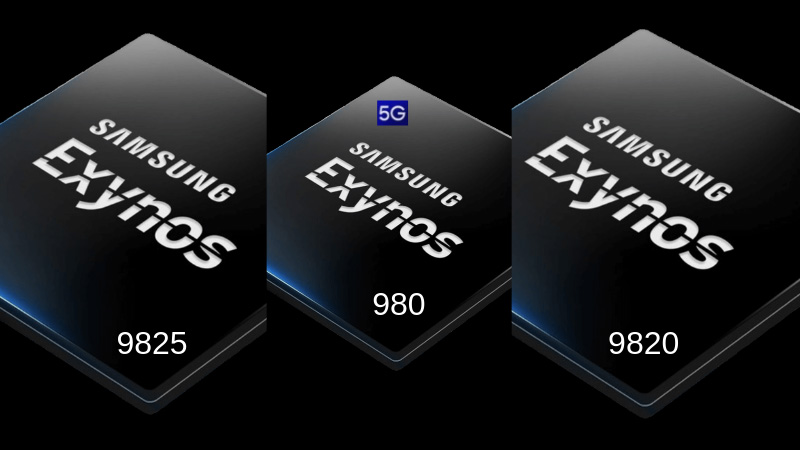Recently, Samsung launched a 5G-compatible chipset called Exynos 980. This chip is all about ensuring 5G connectivity for Samsung’s future phones of Samsung. Now, how does Exynos 980 fair against the likes of Exynos 9820 and Exynos 9825? These are flagship chipset offerings from Samsung. So, let’s look at the similarities and differences between these three.
Exynos 980 vs Exynos 9820 vs Exynos 9825
Here’s the comparison specifications table to find out Samsung chipsets differences.
| Specs | Exynos 980 | Exynos 9820 | Exynos 9825 |
| CPU | Dual Core 2.2GHz + Hexa Core 1.8GHz | Dual Core 2.8GHz + Dual Core 2.4GHz + Quad Core 1.7GHz | Dual Core 2.7 GHz + Dual Core 2.4 GHz + Quad Core 1.4GHz |
| GPU | Mali-G76 MP5 | ARM Mali-G76 MP12 | ARM Mali-G76 MP12 |
| Process | 8nm FinFET | 8nm LPP FinFET | 7nm EUV |
| RAM | LPDDR4x | LPDDR4x | LPDDR4x |
| Display | WQHD+ (3360x1440) | WQUXGA (3840x2400), 4K UHD (4096x2160) | WQUXGA (3840x2400), 4K UHD (4096x2160) |
| Stoarge | UFS 2.1, eMMC 5.1 | UFS 3.0, UFS 2.1 | UFS 3.0, UFS 2.1 |
| Single Camera | Up to 108MP | Rear 22MP, Front 22MP | Rear 22MP, Front 22MP |
| Dual Camera | 20MP+20MP | 16MP+16MP | 16MP+16MP |
| Video | 4K UHD 120fps encoding and decoding with HEVC(H.265), H.264, VP9 | 8K 30fps or 4K UHD 150fps encoding and decoding with 10-bit HEVC(H.265), H.264, VP9 | 8K 30fps or 4K UHD 150fps encoding and decoding with 10-bit HEVC(H.265), H.264, VP9 |
| Charging | Adaptive Fast Charge | Adaptive Fast Charge | Adaptive Fast Charge |
| Modem | 5G NR Sub-6GHz 2.55Gbps (DL) / 1.28Gbps (UL), EN-DC 3.55Gbps (DL) / 1.38Gbps (UL), LTE Cat.16 5CA 1Gbps (DL) / Cat.18 2CA 200Mbps (UL) | LTE-Advanced Pro Cat.20 8CA 2Gbps (DL) / Cat.20 3CA 316Mbps (UL) | LTE-Advanced Pro Cat.20 8CA 2Gbps (DL) / Cat.20 3CA 316Mbps (UL) |
CPU
If we look at the build of the Exynos 980, we have two Cortex-A77 cores clocked @ 2.2 GHz and six other cores clocked @ 1.8 GHz. Moving on to the Exynos 9820, we see two Mongoose M4 cores clocked @ 2.73 GHz, two Cortex-A75 cores clocked @ 2.31 GHz, and four Cortex-A55 cores clocked at 1.9 GHz. We see something similar with the Exynos 9825, too, as there are two Mongoose M4 cores clocked @ 2.73 GHz, two Cortex-A75 cores clocked @ 2.4 GHz, and the other four Cortex-A55 cores clocked at 1.9 GHz here.
Process
The Exynos 980 and 9820 are built on an 8nm node, while the Exynos 9825 goes ahead with a 7nm node. In terms of results in CPU performance, most of the tests put 9825 ahead of 9820, with 980 at proximity.
GPU
The main difference between the 980 and the older two chipsets lies in the GPU department. On the 980, we see a capable but dated Mali-G76 MP5 GPU, while on the other processors, we have the top-of-the-line updated Mali-G76 MP12 GPU on board. However, the difference will be evident only in intense gaming sessions with high graphics demanding games. All three of the processors have support for OpenCL 2.0, DirectX 12, Vulkan 1.1, and OpenGL ES 3.2.
Display
These are all processors for smartphones, so let’s take a look at what each of them provides in the Department of Display. Both the Exynos 9820 and 9825 support UHD+ display at a resolution of 2160 x 3840 pixels. While the Exynos 980 supports WQHD+ display at a resolution of 1440 x 3360 pixels with support for HDR10+ content. So 9820 and 9825 have a slight advantage in the display department.
Storage
They are all similar in storage, as all three support eMMC 5.1 and UFS 2.1 storage. All of them can drive up to LPPDR4X RAM. So there is nothing to differentiate in the storage department.
Camera
The Exynos 980 supports a whooping 108MP single sensor or a dual 20MP+20MP sensor setup support. This is given Samsung’s latest launch of their 108MP camera sensor. So, the Exynos 980 is all about pixel sizes. For the older Exynos 9820 and 9825, we see a single 22MP sensor support or a dual 16MP + 16MP setup support. The Exynos 980 pulls ahead in this category.
Connectivity
Again, the main idea behind the Exynos 980 is its support for 5G connectivity. It provides 2.55 Gbps upload speed and 1.28 Gbps upload speed. It features a 5G modem built-in, so we will see better results than a processor that only has support for LTE. The Exynos 9820 and Exynos 9825 also provide a download speed of 2 Gbps and an upload speed of 316 MBps, but only with an LTE modem. They can be integrated with an additional Exynos 5100 5G modem if there is a need for 5G, but it is not built into them and comes in separately. Additionally, we have other connectivity options like Bluetooth 5.0, USB 3.1, and WiFi 802.11a/b/g in all three of them.
Benchmarks
Regarding single-core, the Exynos 9820 scores 4,474 points, and the Exynos 9825 scores 4,533 points on Geekbench. Regarding multi-core, the Exynos 9820 scores 10,242 points while the Exynos 9825 just clips ahead with 10,611 points in Geekbench. In Antutu, Exynos 9820 scores 3,62,292 points, while the Exynos 9825 goes ahead here, too, with 4,42,568 points.
Unfortunately, the Exynos 980 is not yet available on any device out there, so it is not possible to compare its score with the other two. We must wait a while to see how the Exynos 980 fairs against these two flagships.
Which one is the Best Processor?
On paper, it is quite clear that the Exynos 980 might be a new processor with a built-in modem, but it is still not good enough to go against the likes of Exynos 9820 and Exynos 9825. In terms of overall performance, though, the Exynos 9825 is the clear winner, all thanks to its 7nm built and higher clocked cores. The Exynos 9820 comes in as a close second, followed by the Exynos 980.



